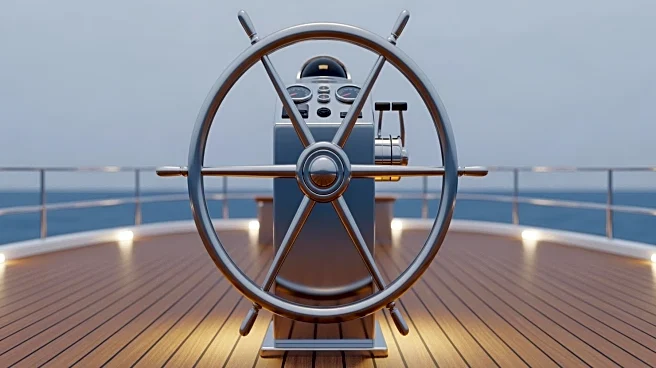What's Happening?
The International Maritime Organization (IMO) has postponed the adoption of the Net-Zero Framework (NZF), a significant plan aimed at reducing greenhouse gas emissions from the shipping industry. The decision
to delay the vote for one year follows a week of pressure and delay tactics from the United States, Saudi Arabia, and other countries. This postponement undermines years of work on the IMO's plan to cut emissions, according to Transport & Environment (T&E). Dr. Alison Shaw, IMO Manager at T&E, expressed concern over the delay, emphasizing the need for climate-ambitious countries to continue pushing for meaningful decarbonization in the shipping sector.
Why It's Important?
The delay in adopting the Net-Zero Framework is significant as it affects global efforts to reduce emissions from the shipping industry, a major contributor to climate change. The postponement could push the framework's implementation to 2030, even if adopted in the next session. This situation highlights the geopolitical tensions influencing international climate agreements. The delay also underscores the importance of regional actions, such as those by the European Union, to maintain momentum in reducing shipping emissions. The outcome of these negotiations could impact global trade, environmental policies, and the future of sustainable shipping practices.
What's Next?
The next session for the adoption vote is scheduled for October 2026. During this time, member states are encouraged to strengthen the framework to ensure it delivers tangible emission reductions. Key elements like incentives for green e-fuels and safeguards against deforestation-driven biofuels need development. The European Union is expected to continue enhancing its maritime policies to tackle emissions independently. The delay provides an opportunity for climate-ambitious countries to build a strong majority in support of decarbonization, potentially influencing future negotiations and the global shipping industry's direction.
Beyond the Headlines
The delay in adopting the Net-Zero Framework raises questions about the influence of geopolitical power dynamics on international climate agreements. It highlights the challenge of balancing national interests with global environmental goals. The situation also points to the potential for regional leadership in climate action, as seen with the European Union's continued commitment to green shipping policies. This development could lead to a shift in how international climate agreements are negotiated and implemented, emphasizing the need for collaboration and compromise among nations.











